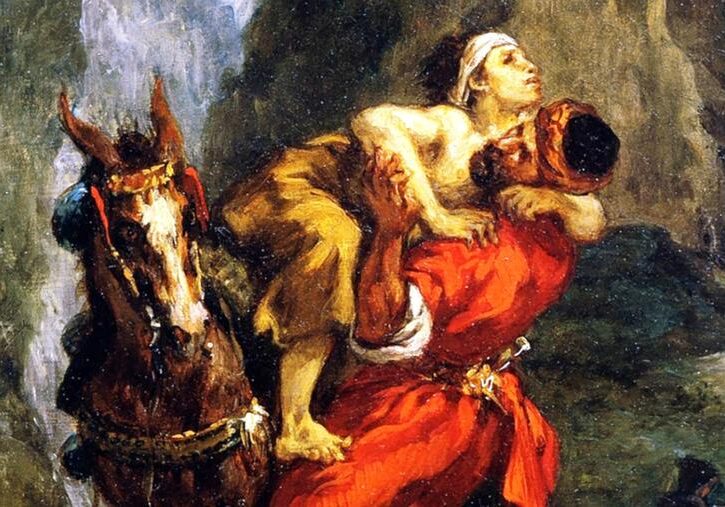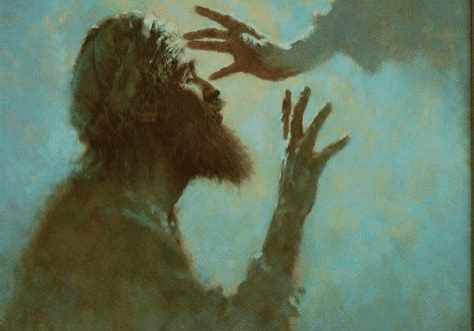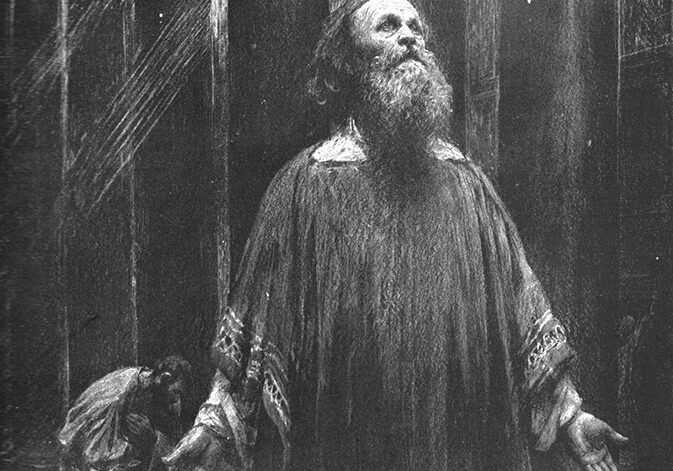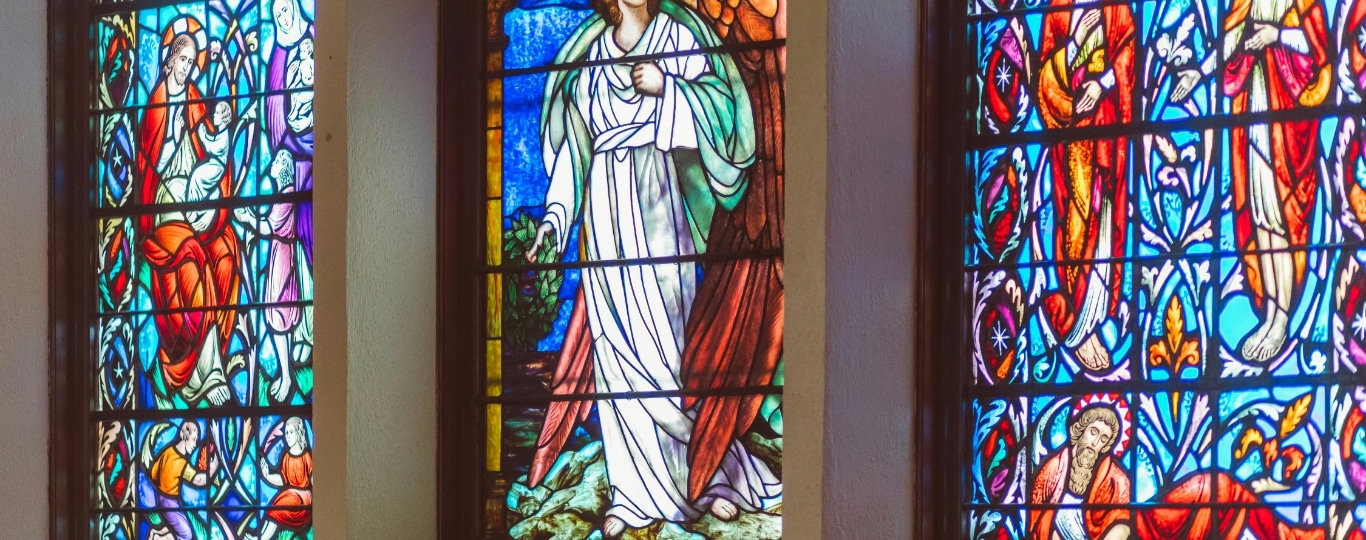†
The foreword of the Easter Even service, as set out in our bulletin tonight, reads, ‘The office is exceedingly ancient, extending back to the earliest days of the Church.’ — The rites we have moments ago performed, (the Liturgy of the Word and the rededication of our Baptismal Vows), date back to the initiation of the ancient Catechumenate. The Catechumenate were those new Christians who were being trained to become members of Holy Mother Church. After their training, these new Christians were traditionally initiated and brought in as newly born members of the Church as living members of the Body of Christ through a formal rite or service. And this was all done at the Easter Even service. — The height of this celebration came as the catechumenates received the sacrament of Holy Baptism, which would allow them their long hoped-for-desire – to participate with the other members of the One, Holy, Catholic, and Apostolic Church in the Sacred Feast of Christ’s Supper – the Holy Communion. Up to that point, the members of the Catechumenate were restricted from the LORD’s Table. This was the custom of the corporate leadership of the Church as a means of ensuring that all those who came to Christ’s Table were either mortifying the corrupt affections of their flesh or had already mortified those affections.
There was a time in the Church when the rigors set forth to become a member of Christ’s family invoked some skeptics to cynicism. For example, in light of Christ’s appeal for all to ‘Come unto Me, for I will refresh you’, one pagan philosopher in the 3rd century named Celsus, was famous for saying, “Even if all people longed to be Christians, [doing whatever the Church leadership told them to do], the Christians would not want them.”1 — Celsus’ comment was a disparaging and denigrated the ‘high-bar’ placed upon membership & participation in the sacred life of the Church.
To be true, the Church did have a ‘high-bar’, as candidates for Holy Baptism necessarily needed to meet certain criteria. For example, it needed to be known if the candidates were hungry with a heart-felt curiosity to read, mark, learn, and inwardly digest the Holy Scriptures of GOD. It was also important to know if they would pursue a high-ideal of moral virtue. In other words, was their profession of desire to become a Christian jeopardized by the fact that they “were charioteers, gladiators, sculptors of idols, cheeky thespians, brothel keepers, lude theater producers, or immoral magistrates? And if any one of them was connected to the pervasive apparatus of paganism, its idolatry, its violence, and its impurity”2, were they willing to cut their ties from such havens of superfluity of naughtiness, proving their Christian profession, no matter the worldly cost? If so, then it was believed they could, with training, endure the Catechumenate training and receive the blessed sacrament of Baptism. If not, they were turned out as those who did not truly love the LORD, lacking the desire to honestly obey His commandments.
To prove their Christian mettle, the catechumens were required to undergo three years of training before they could be considered for the candidacy of Holy Baptism on Easter Even. This time frame allowed these folks to receive training in the entirety of the Holy Scriptures, and for their lives to be more closely examined. Once accepted, these ‘baby’ Christians were only allowed to participate in the Holy Communion service up to the Liturgy of the Word, (the reading of the Psalms, OT, Epistle, & Gospel). At that point, they were excused from the Divine Service, taken by the Catechists to continue in their training and study while the rest of the baptized Family of GOD participated in the rite of Holy Communion.
Now, you might be thinking, ‘why all the fuss – isn’t this excessive?’ — Well, the intent was for a good purpose, and the 21st century Church could learn a great deal from this ancient practice. — Here is the moral! The early Christian Church’s focus was not on the quantity of its membership but on its quality. — The leadership of the early Church was more interested in knowing if the folks seeking to become part of the local Body of Christ were honoring the widows – if they were visiting the sick – if they were making every effort to do every good work that they were instructed in – and if they were loving JESUS by obeying His commands. In other words, the concern was not only for theological expertise and orthodoxy in the knowledge of the Holy Scriptures, but also for the Faith lived out. Were these candidates for Holy Baptism adhering to the LORD’s call for Christian charity & justice – were they daily practicing humility and self-sacrifice as a prize above all else – and were they committed, through daily devotion, to love their neighbors as themselves? That is, to become a member of the family of GOD in Christ through Holy Baptism, were these, desiring to be called Christians and included in the family of the faithful, doing the very things that make a Christian a Christian? Were they acting out the part of their verbal confession of the Faith once delivered?
And now for me and you. Let’s examine ourselves. — In the spirit of the rigors of the ancient Christian Catechumenate, are we worthy to have entered the sanctuary this evening presenting not only our confession of theological bone fides, but also the testimony of our lived faith as Christians, ‘mortifying our corrupt affections’ through the burial of our flesh with Christ through the renewal of our Baptismal vows. — Like the ancient Catechumenate, on this most Holy Night, having again renounced the vain pomp of the world, the flesh, and the devil, are we worthy to approach the sacred mysteries of Christ’s Body and Blood? I hope so, for in the rededication of our baptismal vows, we have committed to love the Most-HIGH GOD and our neighbors as ourselves. And in truth, we have followed the Light of Christ, in the form of the Paschal Candle, as a reflection of how we will walk out the remainder of our days on this earth … in the shadow of the Light of Christ … giving thanks to GOD no matter what comes our way. This was and is our solemn oath.
Therefore, dear brothers and sisters of St. Mark the Evangelist, in an earnest desire to maintain our steadfastness as Christians, let us do as Christians do, as we say what Christians say. Let us fulfill our Baptismal vows, ‘continually mortifying our corrupt, worldly affections’, so that we, like the early Church’s Catechumenate, will seek to walk in the Resurrection Life of the LORD JESUS – passing through the grave and the gate of death, rejecting, at all costs, the ‘pervasive apparatus of paganism, its idolatry, its violence, and its impurity.’
Brothers & sisters of St. Mark the Evangelist, tomorrow morning, we will declare that Christ is risen! We will shout out, ‘Alleluia!’ — Let us from this time forth, like our forebears in the early Church, the ancient Catechumenate, confess in word and deed the anthem we have just sung: “Our hearts be pure from evil, that we may see aright, the LORD in rays eternal of Resurrection Light. And listening to His accents may hear so calm and plain, His own ‘All Hail’, and hearing, may raise Christ the Victor’s strain.”3
Now, may Christ, the Morning Star, who knows no setting, find us ever burning with His Passion to reconcile the world through our mission of belonging, believing, and becoming in the Anglican Way. —And now, may all praise and glory be to Him who was dead but now liveth and reigneth with the Father and the Holy Ghost, even JESUS the Christ, world without end. Amen.
1 Harmless, Wm., Augustine & the Catechumenate, 39.
2 Harmless, 41.
3 The Book of Common Praise, The day of Resurrection, Hymn 123.
Join Us for Biblical Worship, Study, & Fellowship
Sundays:
Morning Prayer 9:45 am
Coffee & Catechesis 10:30 am
Holy Communion 12:00 pm
Thursdays:
Holy Communion 6:00 pm
Recent Sermons




